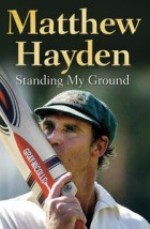Standing My Ground: The Autobiography of Matthew Hayden
Archie Mac |Published: 2010
Pages: 402
Author: Hayden, Matthew with Craddock, Robert
Publisher: Michael Joseph
Rating: 3.5 stars

There are two types of cricket autobiographies, those written by players still playing for their country and those written by retired players. The former tend to be sanitised affairs, with little mention of controversy, as the subject knows he has to face his team-mates in the dressing room, with all references to themselves underlined in their copy of the authors work.
The biographies penned by recently retired players tend to be much more controversial and with Matthew Hayden being known by some as an arrogant flat track bully, this biography had the potential to be a ‘tell all’ effort, instead the book has little controversial content.
Despite the lack of sensationalism, Standing My Ground is still entertaining, with Hayden providing insights into his and his team-mates mind set, and approach to their great run in international cricket.
Hayden admits his aggressive approach was very much to the fore when it came to sledging. Nominating himself as one of the leaders when it came to ‘mental disintegration’ Hayden considered it just part of the game. The fact he was never charged for dissent suggests an ability to remain in control of his emotions.
Controlling his emotions when batting, especially in his early games in the Australian Test team does not seem as evident in Hayden’s writings, he comes across as insecure and unsure of his ability. Hayden’s transformation from a limited player to one of the dominant openers in world cricket is not clear. He does write that he decided to back his aggression, however it seems the decision to develop three variants of the sweep shot, which greatly helped him to succeed against India in 2001 in one of the great three Test series in Test match history, gave him the belief in his ability. His performance in this series against a rampant Harbhajan Singh on turning pitches is rarely mentioned when the ‘flat track bully’ accusations are levelled at Hayden and his impressive record.
The other part of Hayden’s success which he acknowledges is his batting partnership with fellow catholic Justin Langer, in which Hayden would mark a line on the crease, which Langer would make into a cross when the openers swapped ends. Any relevance religion had in Australian cricket seemed lost after ‘Tiger’ O’Reilly called the board on their nebulous claims, that the catholic contingent of the Australia team, were not giving their full support to Freemason Bradman. So it was interesting to read about Hayden’s connection with both his religion and his mate Justin Langer and the effect Langer’s retirement had on the termination of his own career.
The camaraderie between all of the Australian team is one of the reasons Hayden gives for the strength of one of the most successful teams in cricket history. Hayden writes of when he had a verbal with one of the English bowlers on the field and a number of Englishmen became instantly involved he knew the 2005 Australians were in trouble, and for the first time in his experience he believed the Englishmen were truly a team.
The book is not all serious analysis of the game of cricket. Hayden’s description of his first commentary stint with Geoffrey Boycott, and his confession he did not face Brett Lee in the nets because he was scared (said tongue in cheek), are lighter moments, in what is a well written autobiography. Overall this book is an enjoyable read and should be a big seller this Christmas.






Leave a comment